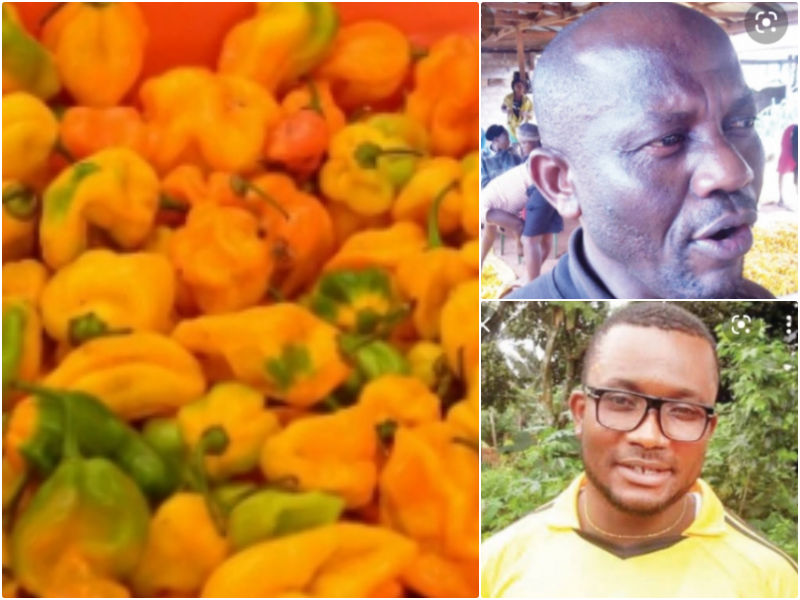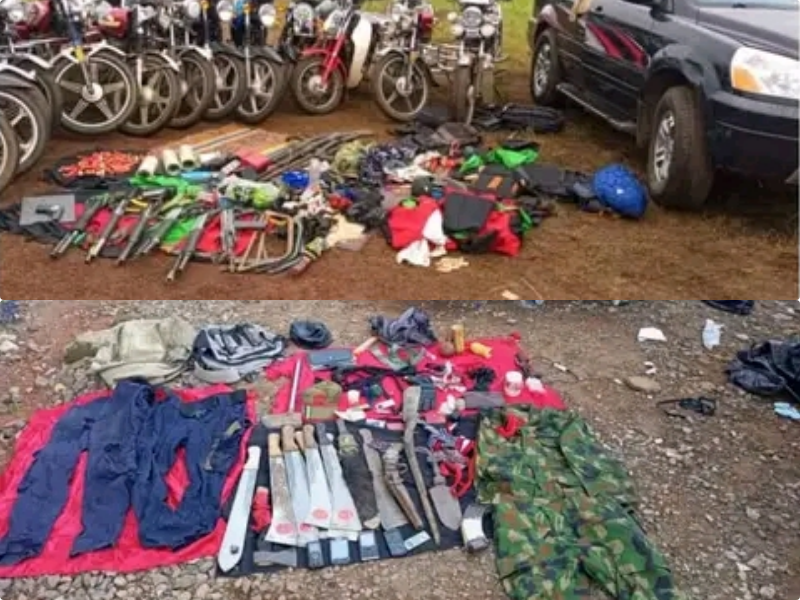You may call it gold mine, oil well or money spinning business, you may not be entirely wrong. But Yellow pepper has become a source of succour, financial support and empowerment to tens of hundreds of farmers in Enugu state.
The fact remains that farming in the unique Nsukka yellow pepper, the famous Ose Nsukka has lifted hundreds, if not thousands, out of abject poverty in the Enugu North Senatorial Zone of Enugu State.
The Nsukka Yellow Pepper, aka Ose Nsukka, reputed as the only yellow pepper in tropical Africa, is grown only in the Nsukka area of Enugu State. Nutritional experts say it is rich in vitamins, its natural aroma coupled with the beautiful bright yellow colouration irresistible as it usually keeps one salivating, especially when fresh. Said to be the favourite of housewives, especially in the eastern part of the country, Ose Nsukka, as our reporter gathered remains a pepper specie to be beaten in the south East zone.
Pattern of cultivation
However, a survey in the senatorial zone revealed a consistent pattern of cultivation, harvest, sales, profit and business expansion among farmers of Ose Nsukka who confessed, in chats with Within Nigeria to not only earning a living but also to making it big farming the unique spice.
Our investigation equally revealed that because it is believed that the specie can only grow in Nsukka, hundreds of farmers in the area have continued to channel their resources into production of the crop, thereby making fortunes out of it as this specie of pepper is highly sought-after, attracting buyers from every part of the country.
According to our findings, the farmers recently got a boost from the Central Bank of Nigeria (CBN), what with the nation’s apex bank shortlisting 600 of them for its agricultural loan scheme and thereby setting the stage for the emergence of a new set of millionaires from the area.
Director General, Nsukka Chamber of Commerce, Industry, Mines and Agriculture (NCCIMA), Dr. Dan Ochi told our reporter at the Chambers’ meeting with farmers in Nsukka recently, that the loan was arranged with the CBN to empower farmers to be able to produce Ose Nsukka in commercial quantities so that farmers could export much of their produce, say to Europe and America.
“Each of the 600 farmers screened and shortlisted by the CBN will have his or her account credited with N900,000 after the training programme by the bank without any collateral,” Dr. Ochi explained, disclosing that the Chambers had acquired many hectares of land in Uzo-Uwani Local Government out of which each of the 600 farmers will be given a hectare to cultivate the yellow pepper and, by so doing, expand their production and earn bigger profits.
The NCCIMA boss further explained that the Chambers acquired the land to enable it monitor the farmers and ensure that they repay their loans as and when due because it was the Chambers that acted guaranteed the loans.
“This empowerment will create employment as each farmer is expected to employ at least three persons who will assist him or her since the farmer alone will not be able to farm one hectare of land (12 plots),” Ochi stressed.
Within Nigeria gathered, however, that more than 30 rural farmers who applied for the loan were not shortlisted because they either did not have Bank Verification Number (BVN) or the ones they submitted were not verifiable.
But to the beneficiaries, Dr. Ochi said: “My advice to beneficiaries is that they should see this opportunity as a lifeline that will catapult them to the next level in life.”
Our visit to Agbani Pepper farm
Our Correspondent visited some of the pepper farms and discovered that many farmers were already at the second stage of harvest of the crop.
At Agbani pepper farm in Nsukka Local Government Area, many farmers enthused that this year has so far been their best year as far as pepper farming is concerned.
One of them who gave her name as Dorathy Ugwu explained: “We are already at the second stage of the harvest. We started the harvest in May. I must confess that I made over N2m in this business. Last year I made about N800,000. But this year was different.”
Asked what could have been the likely cause of the bumper harvest, Ugwu, a retired civil servant, told our reporter that, “You know, everything has been expensive this year. But beyond that, the demand for the pepper is growing everyday from big cities like Onitsha, Lagos, Aba, Port Harcourt and Abuja.”
Another farmer, Mrs Eucharia Eze told our reporter that ” this is my first time of venturing into this farming business. But I must tell you, it is a lucrative farming business. I invested about N20,000 in this farming this year. But as I speak with you, I have made over two hundred thousand naira from the investment. I am a primary school teacher and I have to go into this business my friends are making millions of naira from it. Next year by God’s grace, I will invest more than three hundred thousand.”
A visit to Ikpa commodity market
Our Correspondent also visited Ikpa commodity market, Nsukka, where the yellow pepper is sold and packaged for an onward transportation to some of the aforementioned cities. Chairman of the Ikpa market Yellow Pepper Dealers Association, Lagos line, Mr. Lucky Eze described the Nsukka yellow pepper as simply the best, given that “people from different parts of Nigeria, despite the perishable nature of the pepper, still travel from far and wide to come and buy the produce.”
Eze, an Uzo-Uwani-born farmer who has been in the business in the past 20 years, described Ose Nsukka’s aroma as “special without compare.”
“You can get yellow pepper in Jos or any other place, but you will never get the same flavour you get in Nsukka yellow pepper from any other pepper, and that is why Ose Nsukka is the most sought-after,” he enthused.
On the price, Eze said it varies from time to time, but that currently a bag sells for between N20 000 and N25,000 while a measure goes for about N2500.
Ogbu Obinna, a graduate and yellow pepper farmer said, in a chat with Within Nigeria that: “Ose Nsukka farming is a good business that requires commitment and resources. One needs a large expanse of land to do the farming. I started the yellow pepper farming four years ago, when I finished my National Youth Service Corps and retuned home without having any tangible work at hand. So, I took N500,000 loan from a bank to start up the farming. Today, I have made lots of progress in the pepper farming business and have since paid back the loan. The profit from the business has made me a complete man. I’m happily married, I have a car and currently, I’m building a two-storey house.”
While dispelling the belief that the species cannot grow in any other part of the country, Ogbu, an alumnus of the Institute of Management and Technology (IMT), argued that “Nsukka soil is very rich for yellow pepper farming but while the pepper can grow in any other soil, it will not do as well as it does in Nsukka. He advised youths in the area to think more of farming business than white collar jobs, which, according to him, “are no longer forthcoming.”
“It is unfortunate that most of the youths, especially graduates today, are not interested in the farming business simply because the process has to do with physical energy,” he lamented.
However, our reporter also visited a Microfinance bank in Nsukka to ascertain how far pepper farmers sought financial assistance through loan facilities, one of the credit officers who who did not want his name in print, told our reporter that pepper crop production accounted for 60% of all agricultural loans the bank had disbursed so far.
“We receive so many more applications from pepper farmers than from those of any other crop,” he declared.
According to the credit officer, ” every year, we receive more one hundred applications from yellow pepper farmers unlike other crop farming like cassava, maize, garden egg or tomatoes which account for about forty cumulatively. Surprisingly too, these pepper farmers don’t default in the repayment of the loan.”
Cultivation process
Explaining the processes of production of the pepper, Makata Ngozi who doubled as a yellow pepper farmer and marketer said: “During the month of November, we will do ridges and nursery and by February, the cultivation will kick off. After cultivation, we transplant them from nursery to the cultivated farm lands. Immediately after, we start irrigating the farm every morning and evening until rain starts falling.
However, you must monitor your farm as the pepper grows; we apply manure and fertiliser when necessary and weed off the unwanted grass in the farm.
On why Nsukka is the only place this special yellow pepper thrives, Ngozi replied: “God made it so. It is one of the many things God used to bless Nsukka land. It’s the pride of Nsukka people, and we are reaping the benefits from it. We know that many farmers in other parts of the country are currently trying hard to grow yellow pepper and make it grow well in their places so they can also reap its financial benefits.”
However, until that happens, the business of Ose Nsukka farming remains the exclusive preserve of Nsukka Cultural Zone, the black gold of the people of the area, and is likely to remain so for a long time to come – growing in leaps and bounds and making many graduates, farmers and families flourish socioeconomically.




